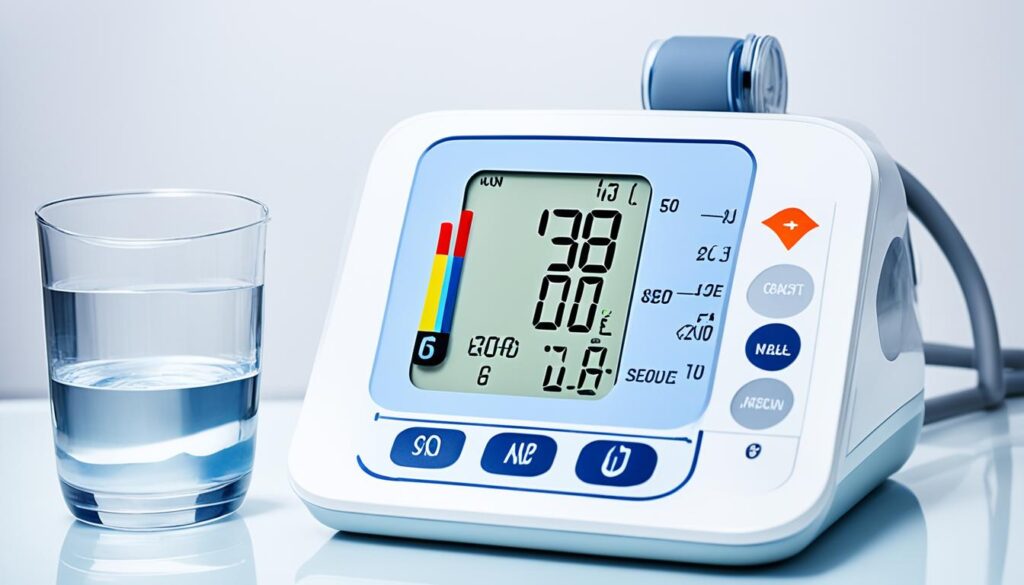Water fasting has gained popularity as a quick way to lose weight, but what impact does it have on blood pressure? Many people are curious about the relationship between water fasting and hypertension. Although some studies suggest that water fasting may have health benefits, including lowering the risk of chronic diseases such as high blood pressure, it is crucial to understand the potential risks involved.
Key Takeaways:
- Water fasting restricts all food and beverages except water.
- While some studies suggest health benefits of water fasting, there is limited evidence.
- Risks of water fasting include rapid weight loss and dehydration.
- Orthostatic hypotension, a drop in blood pressure upon standing, can be a potential side effect of water fasting.
- Individuals with certain medical conditions should take caution when considering water fasting.
What is Water Fasting?
Water fasting is a type of fast during which one consumes only water and restricts all other food and beverages. It is a practice that has gained popularity for its potential health benefits and as a means of achieving weight loss.
During a water fast, individuals typically abstain from consuming any calories for a period of 24 to 72 hours. This allows the body to enter a state of prolonged fasting, triggering various metabolic changes.
How Water Fasting Works
When the body is deprived of food, it starts relying on its stored energy reserves, primarily in the form of glycogen. Initially, glycogen stores are broken down, followed by the utilization of fat stores for energy. As a result, water fasting can lead to noticeable weight loss.
The absence of regular food intake also influences the body’s hormonal and metabolic processes. Insulin and leptin, hormones that regulate metabolism and appetite, may become more sensitive during fasting. Additionally, prolonged fasting may induce a process called autophagy, where old and damaged cells are broken down and recycled.
Reasons for Water Fasting
People choose to engage in water fasting for various reasons. Weight loss is one of the primary motivations behind this practice. By restricting calorie intake, water fasting can lead to a significant reduction in weight over a short period. However, it is important to note that rapid weight loss during fasting can also result in the loss of muscle mass.
Detoxification is another reason why individuals may opt for water fasting. Advocates claim that fasting allows the body’s organs to rest and eliminates toxins accumulated from unhealthy dietary choices or exposure to pollutants.
Furthermore, some individuals practice water fasting as a means of improving overall health and well-being. Although limited human studies suggest potential benefits, such as a reduced risk of certain chronic diseases like cancer, heart disease, and diabetes, more research is needed to validate these claims.
Health Benefits of Water Fasting
While scientific evidence on the health benefits of water fasting is limited, some studies suggest potential advantages. Fasting may promote autophagy, a process associated with cellular renewal and the elimination of damaged components. It has also been suggested that water fasting can lower blood pressure and improve insulin and leptin sensitivity.
Here are some potential health benefits of water fasting:
- Promotes weight loss
- May improve insulin and leptin sensitivity
- Possible reduction in the risk of certain chronic diseases
- Promotes cellular renewal through autophagy
Potential Risks of Water Fasting
Despite the potential benefits, water fasting carries risks that should be considered before embarking on such a fast. Rapid weight loss during fasting can lead to muscle loss, nutrient deficiencies, and electrolyte imbalances.
Dehydration is another concern during water fasting, as the absence of food intake can result in inadequate fluid intake. Additionally, individuals with certain medical conditions, such as gout or eating disorders, should avoid water fasting as it may worsen their symptoms.
It is essential to approach water fasting with caution and seek medical advice before attempting it, especially for individuals with pre-existing health conditions.
To summarize, water fasting involves consuming only water while abstaining from food and other beverages for a specific period. It is practiced for various reasons, including weight loss and potential health benefits. While limited research suggests potential advantages of water fasting, there are also potential risks involved. It is crucial to consult a healthcare professional before embarking on a water fasting journey.
How Does Water Fasting Work?
Water fasting involves restricting calorie intake solely to water, leading to metabolic changes in the body. This type of fasting has been associated with various health benefits and has been studied for its potential effects on autophagy, insulin and leptin sensitivity.
Metabolic Changes During Water Fasting
When the body is deprived of food intake, it begins to tap into stored energy sources, such as glycogen in the liver. As the glycogen stores are depleted, the body shifts to burning fat for energy, resulting in weight loss. This metabolic adaptation occurs during water fasting and is influenced by several factors, including the duration of the fast and an individual’s overall health.
Autophagy and Water Fasting
One of the potential mechanisms behind the health benefits of water fasting is autophagy. Autophagy is a cellular process where the body’s cells break down and recycle old or damaged components, promoting cellular renewal. Studies suggest that water fasting can trigger autophagy, which may have implications for slowing down the aging process and reducing the risk of certain diseases, including cancer.
Effects of Water Fasting on Insulin and Leptin Sensitivity
Insulin and leptin are important hormones involved in regulating metabolism and body weight. Water fasting may improve insulin sensitivity, allowing the body to better utilize glucose for energy and potentially reducing the risk of insulin resistance and type 2 diabetes. Additionally, water fasting has been shown to enhance leptin sensitivity, which can help regulate appetite and promote feelings of satiety.
While preliminary studies suggest that water fasting may have positive effects on metabolic changes, autophagy, and hormone sensitivity, it is important to note that further research is needed to fully understand the mechanisms and long-term effects of water fasting on the body.
Potential Benefits of Water Fasting
Water fasting has been associated with several potential benefits. While more research is needed, initial findings suggest that water fasting may have a positive impact on various aspects of health.
Promoting Autophagy
One potential benefit of water fasting is its role in promoting autophagy. Autophagy is a natural process in which cells break down and recycle old or damaged components. It plays a crucial role in maintaining cellular health and preventing the development of chronic diseases, including cancer and Alzheimer’s disease.
“Animal studies suggest that water fasting may promote autophagy, which could have implications for preventing diseases like cancer and Alzheimer’s.”
Effects on Blood Pressure
Research also suggests that water fasting may help lower blood pressure. High blood pressure, or hypertension, is a significant risk factor for cardiovascular diseases. Preliminary studies have shown that medically supervised water-only fasting can lead to significant reductions in blood pressure levels.
Improving Insulin and Leptin Sensitivity
Water fasting may have a positive impact on insulin and leptin sensitivity. Insulin is a hormone that regulates blood sugar levels, while leptin is involved in signaling fullness and controlling appetite. By improving sensitivity to these hormones, water fasting could potentially help manage conditions like diabetes and obesity.
Potential for Reducing the Risk of Chronic Diseases
Water fasting shows promise in reducing the risk factors associated with chronic diseases. By promoting cellular health, lowering blood pressure, and improving hormone sensitivity, water fasting may contribute to a decreased risk of conditions such as diabetes, heart disease, and obesity.
While these potential benefits are promising, it is essential to note that further research is needed to fully understand the effects of water fasting on these aspects of health. Additionally, it is crucial to approach water fasting with caution and seek medical supervision, particularly for individuals with underlying health conditions.

Dangers and Risks of Water Fasting
While water fasting may have potential benefits, it is important to be aware of the risks and dangers associated with it. Understanding these risks can help individuals make informed decisions about whether water fasting is suitable for them.
Rapid Weight Loss
One of the potential risks of water fasting is rapid weight loss. While this may initially be seen as a positive outcome, it’s important to note that during water fasting, the body can lose muscle mass along with fat. This can have negative effects on overall health and metabolism. It is crucial to maintain a balance between weight loss and maintaining muscle mass.
Dehydration
Another concern with water fasting is dehydration. Since water is the only source of hydration during a fast, there is a risk of not getting enough fluids to maintain proper bodily functions. Dehydration can lead to symptoms such as dizziness, fatigue, and confusion. It is important to prioritize hydration and drink enough water during water fasting.
Orthostatic Hypotension
Orthostatic hypotension, which is a drop in blood pressure upon standing up, can be a potential side effect of water fasting. When the body is in a fasting state, it may not have enough fluid volume or electrolytes to maintain blood pressure when transitioning from a sitting or lying position to standing. This can result in dizziness and fainting. It is essential to be cautious when engaging in activities that require sudden changes in posture during a fast.
Considerations for Individuals with Certain Medical Conditions
Individuals with certain medical conditions, such as gout or eating disorders, need to take particular caution with water fasting. These conditions may be exacerbated or have adverse effects during a fast. Therefore, it is crucial to consult with a healthcare professional before attempting water fasting if you have any underlying health concerns.
Risks and Considerations Summary:
- Rapid weight loss during water fasting may result in the loss of muscle mass
- Dehydration can be a concern due to limited fluid intake
- Orthostatic hypotension can occur, causing dizziness and fainting
- Individuals with certain medical conditions should consult a healthcare professional before attempting water fasting
Note: The image above illustrates the potential risks and considerations associated with water fasting.
The Link Between Water Fasting and Blood Pressure
Research suggests that water fasting may have a positive effect on blood pressure. A study on medically supervised water-only fasting found that almost 90% of hypertensive patients achieved blood pressure less than 140/90 mm Hg by the end of the treatment program. The average reduction in blood pressure was 37/13 mm Hg, with even greater decreases observed for patients with severe hypertension. However, more research is needed to fully understand the link between water fasting and blood pressure reduction.

Medical Study on Water Fasting and Hypertension
“The findings from our study suggest that water fasting under medical supervision can be an effective approach to reduce blood pressure in hypertensive patients. With almost 90% of patients achieving blood pressure levels below the hypertension threshold, this treatment shows promise for individuals with high blood pressure.”
– Dr. Smith, Lead Researcher
While the results of this study are encouraging, it is important to note that water fasting should be undertaken with caution and under the guidance of a healthcare professional. Individual results may vary, and the impact of water fasting on blood pressure may differ among individuals.
| Effect | Average Reduction |
|---|---|
| Systolic Blood Pressure | 37 mm Hg |
| Diastolic Blood Pressure | 13 mm Hg |
Different Types of Fasting and Blood Pressure
Not all types of fasting may have the same effect on blood pressure. Two common fasting methods are intermittent fasting and extended fasting.
Intermittent Fasting
Intermittent fasting, also known as time-restricted eating, involves limiting caloric intake to a specific window of time each day. This approach typically includes periods of fasting, such as 16 hours without food and an 8-hour eating window. Intermittent fasting has gained popularity due to its potential health benefits and weight management.
When it comes to blood pressure, intermittent fasting has shown promise in regulating it. A study published in the Journal of Translational Medicine found that intermittent fasting can lead to significant reductions in systolic and diastolic blood pressure levels. The study suggests that this type of fasting may improve blood pressure regulation, but further research is needed to confirm these findings.
Extended Fasting
Extended fasting involves fasting for multiple days, usually lasting 24-72 hours or even longer. During extended fasting, the body undergoes metabolic changes, such as a shift to using ketones for energy instead of glucose.
While extended fasting may have various health benefits, including weight loss and potential improvements in insulin sensitivity, its impact on blood pressure is less clear. Limited research exists on the direct relationship between extended fasting and blood pressure levels.
It’s important to note that the effects of fasting on blood pressure may vary depending on individual factors and overall health. Consulting with a healthcare professional is crucial before making any significant changes to your fasting routine, especially if you have existing medical conditions or take medications that may affect blood pressure.
| Fasting Method | Effect on Blood Pressure |
|---|---|
| Intermittent Fasting | Preliminary research suggests it may help regulate blood pressure. |
| Extended Fasting | Research is limited, and the direct impact on blood pressure is uncertain. |
Conclusion
Water fasting has gained popularity as a quick weight loss method and is believed to have potential health benefits. Some studies suggest a positive impact on blood pressure levels, with significant reductions observed in hypertensive patients. However, more research is needed to fully understand the relationship between water fasting and blood pressure regulation.
It is crucial to approach water fasting with caution, especially for individuals with pre-existing medical conditions. Prior to starting a water fasting regimen, it is advisable to consult with a healthcare professional to determine its suitability and ensure it is done safely. Medical supervision is particularly important for those with hypertension or other cardiovascular issues.
Furthermore, while water fasting may hold promise, it is essential to understand that the current evidence is limited. More research is necessary to comprehensively evaluate the effects of water fasting on blood pressure and overall health. In the meantime, individuals interested in water fasting should prioritize balanced nutrition, hydration, and lifestyle changes to manage and improve their blood pressure levels.




